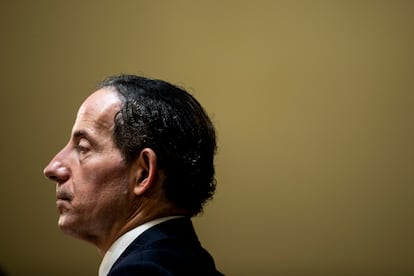Jamie Raskin on US Capitol attack: ‘When Trump ran out of options, he decided to turn to violence’
The lawmaker, who lived through the insurrection just days after his son took his own life, is now one of the most high-profile members of the committee investigating what happened on January 6


On January 6, 2021, the day of the attack on the US Capitol, lawmakers from both the Democratic and Republican parties were waiting in Congress to give their condolences to Jamie Raskin, a Democratic lawmaker from Maryland. A week earlier, he had entered his house in Takoma Park, in the northeast of Washington, and found the lifeless body of his 25-year-old son Tommy beside a suicide note. It said: “‘Please forgive me. My illness won today. Please look after each other, the animals and the global poor for me. All my love, Tommy.” The illness that had defeated the 25-year-old was depression. With teary eyes, Raskin says: “Tommy had a severe, lonely mental health problem. He was battling depression. And Tommy was definitely affected by Covid-19 and by the outrageous irresponsibility of [former US president] Donald Trump in managing Covid-19 as well as all the poison that Trump injected into our political system, all of the polarization and division.”
The impact of both traumatic events – the loss of a son and being on the point of losing democracy – sent the 59-year-old congressman into an “impenetrable darkness,” which he tells EL PAÍS, he was only able to escape after Nancy Pelosi, the Speaker of the House, appointed him to lead the second impeachment against Trump. Although the impeachment did not prosper, it provided solace during a difficult time. The appointment also turned Raskin into a kind of symbol for those who believe America’s democracy is in jeopardy.
One year on, he is now one of the most high-profile members of the Select Committee on the January 6 Attack, which is investigating how what should have been a routine joint session to certify Joe Biden’s election victory turned into one of the darkest days of American democracy. After seeing the attack in person and reliving it through the 500 statements of the people involved, he believes he is close to getting to the bottom of what really happened.
“There was a mass demonstration that became a mob riot, and that surrounded a violent insurrection made up of extremist groups like Proud Boys, Three Percenters, Aryan Nations, First Amendment Praetorians. A number of these groups came to Washington with the idea of leading an assault on the Capitol, and they stormed the Capitol, they broke our windows, they attacked our police officers, but that insurrection surrounded a coup,” says Raskin.
He continues: “A ‘coup’ is an unusual word to use in American political parlance because we don’t really have a lot of experience with this internally in the country. And we think of a coup as something taking place against a president. This was a coup that was orchestrated by the president, against the vice president and against Congress. Donald Trump refused to accept the results of the 2020 presidential election. And he engaged in a series of steps of escalating illegitimacy and danger in order to overturn the results of the election. And having run out of every non-violent option, he decided to turn to violence and unleashed the mob against Congress. And that’s why we saw the violent insurrection.”
Raskin has just published Unthinkable. Trauma, Truth, and the Trials of American Democracy, a book that delves into his personal and family pain following his son’s suicide, while also exploring the key weeks that followed the January 6 insurrection – an event the lawmaker situates in the context of US history and within the ideas of great thinkers, from Thomas Paine to William James. In the book, he also expresses his admiration for former US president Abraham Lincoln, who he thought of repeatedly on January 6. “The nearest we came to danger was on the eve of the Civil War, in February 1861, but even then, Abraham Lincoln’s electoral count was never violently interrupted or deviously diverted by enemies of the republic,” the book reads.
The novel also makes frequent references to the political divisions which have broken the country in two. But while a growing number of voices believe the US is on the brink of a civil war, Raskin is not one of them. “I don’t think we’re close to civil war in the 19th-century sense,” he says. “But I do think that if we don’t get on top of the January 6 insurrectionism and violence, then we are in danger of becoming much more like Northern Ireland. We could see much more racial, ethnic and political and ideological violence in particular communities. We could see more violence at election time and when there are public events.”
Raskin envisaged his book as a “love letter” to his son Tommy, but ended up also being a love letter to his country as well. “Sometimes you choose to write something. Other times, like in this case, that something chooses you,” he says.
Raskin was elected as a representative for Montgomery County on the same day in November 2016 that the US chose to elect Donald Trump to the White House. Instead of attending the president’s inauguration, Raskin – who in some ways had only presented himself as a candidate because he was convinced Hillary Clinton would win – organized a march with a hundred supporters in Rock Creek Park in Washington.
Before being elected, and after pursuing an academic career, Raskin had been a Maryland state senator for more than a decade. In this time, he helped pass hundreds of progressive laws, from abolishing the death sentence to legalizing same-sex marriage and decriminalizing the possession of fewer than 10 grams of marijuana. In Washington, within a Democratic Party stalled by internal divisions, passing legislation is not as easy. “Compared to the Trump administration, we’ve made tremendous progress,” he says. “But it has been a frustration that we were not able to get through our Build Back Better program [an ambitious bill to increase social spending]. A lot of people think that this is a moment like the New Deal with FDR [Franklin D. Roosevelt]. We might have FDR style ambitions, but we do not have FDR style majorities.”
In such a heated context, Raskin has achieved something rare: he has become a popular figure, standing out in the 450-seat chamber, filled with veterans, even though he has little experience. Perhaps it helps that he is the only expert in constitutional law in the House. Before Tommy’s death, he was also considered one of the funniest lawmakers. The editor of The New Yorker, David Remnick, named Raskin his “Person of the Year” in 2021, describing the politician as an “individual who embodies both the tragedy and resilience of our time.” While The New Republic dedicated its January cover to Raskin, with the headline: “Democracy’s Defender: How the Maryland representative became the man for this historical moment.”

This historical moment has been marked by the January 6 insurrection, a day Raskin retells in great detail in his book. Raskin went to the Capitol building the day after his son’s burial. His daughter Tabitha advised him against going, but when he ignored her advice, she decided to go along with him. Hank, the partner of Hannah, Raskin’s other daughter, also decided to make the trip. When the attack began, Raskin was evacuated with the rest of the lawmakers, while Tabitha and Hank hid for three hours in the office of Steny Hoyer, the House Majority Leader.
Raskin remembers that he was scared for his life, but also for his family. He thought a shooter with an AR-15 style rifle would come in at any moment and start firing indiscriminately. When the crisis was over, he promised his daughter that he would take her another day, under better circumstances. She replied: “Dad, I don’t want to go back to the Capitol.”
When asked about what he hopes the investigation into the events of January 6 will achieve, Raskin replies: “The best version would be that we tell the complete, detailed story of everything that happened. And the Republican Party disowns Donald Trump, he lives in infamy and no longer has the power to threaten the American republic. It is more likely that we will release the report and Donald Trump will probably tighten his control over the Republican Party, get people to swear their fidelity to him, but I think that millions of people will leave the Republican Party.”
As for whether Trump will make a bid for the White House in 2024, Raskin is unsure. “It is unclear at this point. The 14th Amendment in section three says that anybody who swears an oath to our Constitution and violates that oath, by engaging in insurrection is not allowed to hold federal or state office again. This was adopted after our Civil War. It would seem to apply here in this situation, but we luckily have little familiarity with this provision and how to make it work and it is something that the committee will have to wrestle with.”
And now that he has become a household name, would he consider a run for the White House? “No, I don’t know. I think that when I was a young man, I probably had a lot more ambition than I do now. I always tell young people it’s good to have personal ambition, but it should be connected to public ambition, too. I have a lot of public ambition and a lot of ambition for my society. I’m feeling a lot less personally. And these days, I miss Tommy a lot. It’s been a tough year for us.” To honor his son’s memory, the Raskins have got behind a number of projects: from legislative initiatives to address the mental health crisis and prizes for young activists to scholarship programs and conferences on mental health.
Tu suscripción se está usando en otro dispositivo
¿Quieres añadir otro usuario a tu suscripción?
Si continúas leyendo en este dispositivo, no se podrá leer en el otro.
FlechaTu suscripción se está usando en otro dispositivo y solo puedes acceder a EL PAÍS desde un dispositivo a la vez.
Si quieres compartir tu cuenta, cambia tu suscripción a la modalidad Premium, así podrás añadir otro usuario. Cada uno accederá con su propia cuenta de email, lo que os permitirá personalizar vuestra experiencia en EL PAÍS.
¿Tienes una suscripción de empresa? Accede aquí para contratar más cuentas.
En el caso de no saber quién está usando tu cuenta, te recomendamos cambiar tu contraseña aquí.
Si decides continuar compartiendo tu cuenta, este mensaje se mostrará en tu dispositivo y en el de la otra persona que está usando tu cuenta de forma indefinida, afectando a tu experiencia de lectura. Puedes consultar aquí los términos y condiciones de la suscripción digital.








































